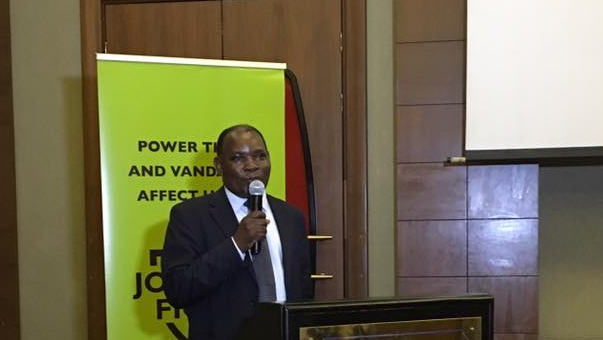Uganda’s leading electricity distribution company, UMEME Limited, injected over USD500m (about Shs1.8trn) in developing necessary infrastructure in 2017, now, they have earmarked a further USD 155 million for new investments in the next year, a top executive said on Thursday.
At the ongoing Electricity Regulatory Authority’s tariff review public hearing at Imperial Hotel, UMEME’s deputy Managing Deputy Mr. Sam Zimbe (pictured above) made the ambitious plans while giving the power giants’ review presentation.

Mr. Zimbe proposed the need to have a single uniform tariff for Domestic customer. This comes after various complaints of variation in computation of Yaka tokens received from the public.
“The regulatory needs to review the lifeline tariff for all Domestic customers (Yaka user) and set a uniform standing charges” Mr. Zimbe said, adding this will help reduce end user tariffs. Introduction of energy rebate is also key especially for industrial customers, He said.
The electricity distribution network has grown from 250,000 customers in March 2005 to over 1,000,000 as of June 30, 2017 with the connections at an average of 13% per annum. By 2020, Umeme targets to increase electricity penetration to 40%, Mr. Zimbe said.
Umeme hasalso largely focused on capital investment, restoration and expansion of the grid, reduction in energy losses, improvements in efficiencies, rollout of prepaid metering, connections of new customers to the grid, and improving public safety improved service delivery, reliability of supply and improving public safety
During the half-year of 2017, a total of US$99m was invested in the network, some of the key projects that were executed include; the construction of a 40 MVA Moniko substation in Lugazi and Mbalala, completion of Namugongo integration lines, GetFit mini hydro project integration lines, upgrade of Lugogo to Kibuli lines, refurbishment of lines in Kabale, Mukono and Pallisa, rollout of prepaid metering and upgrading Namanve Industrial Park, conversion of Government of Uganda accounts to prepaid metering and the upgrade of power transformers across the country. The focus will continue to be on growth and efficiency related projects in readiness for the upcoming generation capacity, Mr Zimbe said.
He added that the company had injected about US$ 1.5m in automated metering so as to improve metering and revenue cycle efficiency, in terms of prepayment metering, US$ 30m has been injected in new connections and US$ 10m to post-paid customer conversion, He added.
Mr Zimbe said “The prepayment has helped the company improve its revenue collection to 99% from 80% in 2005 hence reducing energy losses to 17.5% compared to 38% in 2005 when it took over the management of the distribution network.”
It is worth noting that Umeme is committed to long term investments in the distribution network, achieving sustainable tariffs, focus in energy loss reduction, generate more demand for power, supporting stakeholders and incentivizing performance
Energy prices are adjusted every three months by the regulator taking into account changes in inflation, foreign exchange rates, and fuel prices. The resultant tariffs, charged by Umeme, reflect the costs of power purchase and the costs of distribution and retail supply.

Umeme is an important company in Uganda and distributes 97 percent of electricity in Uganda and has a concession running up to 2025. Shares in the company are held by National Social Security Fund at 23 percent, with the rest held by investment funds Investec Funds, Kimberlite Frontier Africa, SCB Mauritius.
The company has managed to turn around what was a dark period in Uganda’s electricity industry to one of hope. In 2016, Umeme made more than 157,000 connections, increasing its customer base by close to 20 per cent.
It has since its inception in 2005, been focusing on restoration and expansion of the grid, reduction in energy losses, improvements in efficiencies, rollout of prepaid metering, connections of new customers to the grid, and improving public safety improved service delivery, reliability of supply and improving public safety.
The company has also managed to tackle illegal power connections by increasing the number of people who are on prepaid meters. At least 65 per cent of Umeme’s customers are now on prepaid meters, and this has contributed 16 per cent of the company’s revenues.











